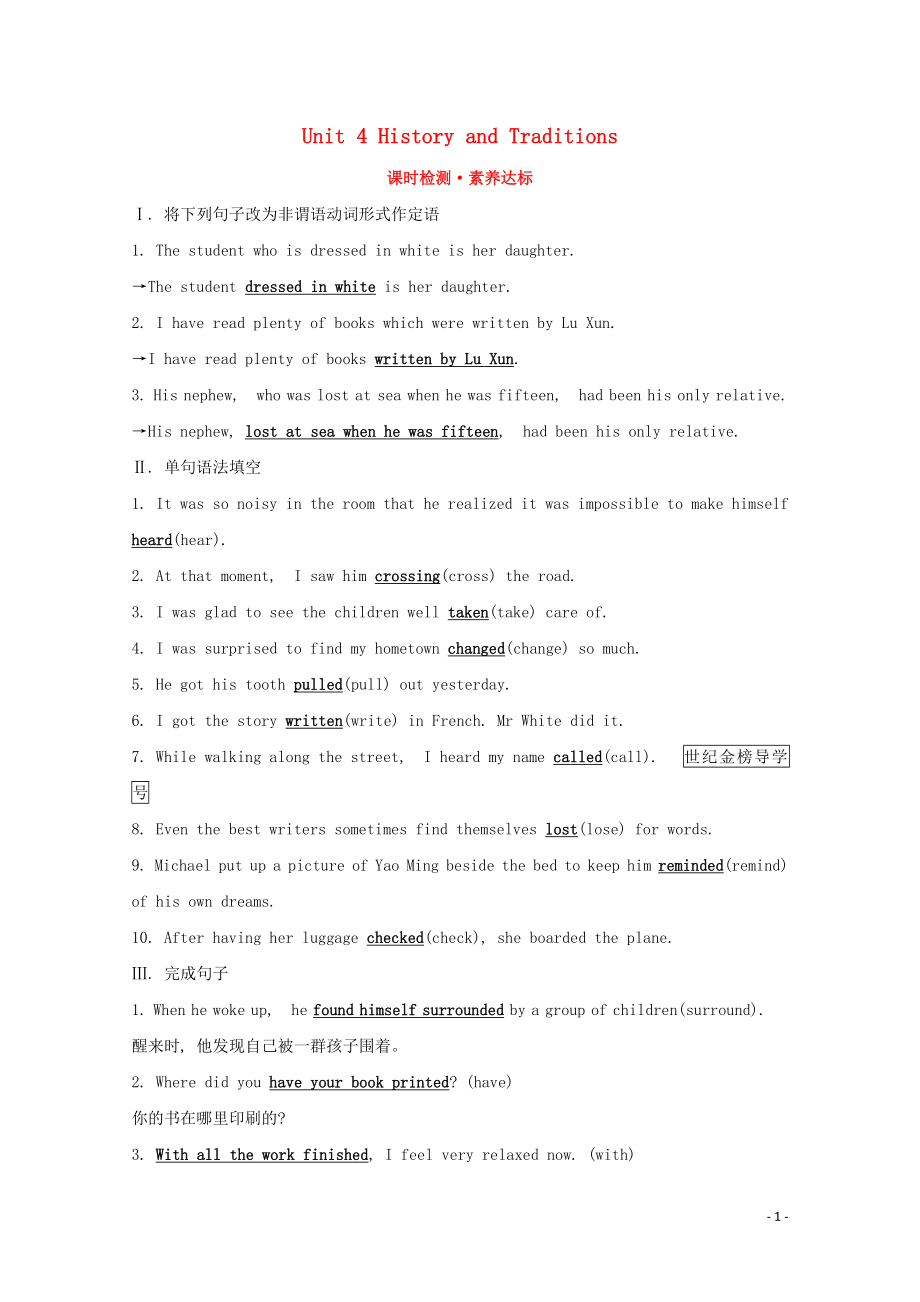《2020版新教材高中英語(yǔ) Unit 4 History and Traditions Discovering Useful Structures課時(shí)檢測(cè)素養(yǎng)達(dá)標(biāo) 新人教版必修2》由會(huì)員分享���,可在線閱讀,更多相關(guān)《2020版新教材高中英語(yǔ) Unit 4 History and Traditions Discovering Useful Structures課時(shí)檢測(cè)素養(yǎng)達(dá)標(biāo) 新人教版必修2(3頁(yè)珍藏版)》請(qǐng)?jiān)谘b配圖網(wǎng)上搜索�。
1、Unit 4 History and Traditions
課時(shí)檢測(cè)·素養(yǎng)達(dá)標(biāo)
Ⅰ. 將下列句子改為非謂語(yǔ)動(dòng)詞形式作定語(yǔ)
1. The student who is dressed in white is her daughter.
→The student dressed in white is her daughter. ?
2. I have read plenty of books which were written by Lu Xun.
→I have read plenty of books written by Lu Xun. ?
3. His nephew,
2���、 who was lost at sea when he was fifteen, had been his only relative.
→His nephew, lost at sea when he was fifteen, had been his only relative. ?
Ⅱ. 單句語(yǔ)法填空
1. It was so noisy in the room that he realized it was impossible to make himself heard(hear).
2. At that moment, I saw him crossing(c
3�����、ross) the road.
3. I was glad to see the children well taken(take) care of.
4. I was surprised to find my hometown changed(change) so much.
5. He got his tooth pulled(pull) out yesterday.
6. I got the story written(write) in French. Mr White did it.
7. While walking along the street, I he
4�、ard my name called(call). 世紀(jì)金榜導(dǎo)學(xué)號(hào)
8. Even the best writers sometimes find themselves lost(lose) for words.
9. Michael put up a picture of Yao Ming beside the bed to keep him reminded(remind) of his own dreams.
10. After having her luggage checked(check), she boarded the plane.
Ⅲ. 完成句子
1. Wh
5���、en he woke up, he found himself surrounded by a group of children(surround). ?
醒來(lái)時(shí), 他發(fā)現(xiàn)自己被一群孩子圍著�。
2. Where did you have your book printed? (have)?
你的書在哪里印刷的?
3. With all the work finished, I feel very relaxed now. (with)?
所有的工作都做完了, 我覺(jué)得現(xiàn)在很輕松。
4. They have their classroom cleaned after school
6�����、 every day. (have)?
他們每天放學(xué)后打掃教室����。
5. While you were out, you should keep your doors and windows closed. (keep)?
外出時(shí), 你應(yīng)關(guān)著門和窗子�。
6. We had better work harder to get our homework finished on time. (get)?
我們最好努力一點(diǎn)以便按時(shí)做完作業(yè)。
7. They knew her very well. They watched her grow up from childhood. (grow)
7��、?
他們對(duì)她很了解����。他們看著她從小長(zhǎng)大的。
8. With the wall painted white, the room seems larger. (paint)?
墻刷成白色的了, 房間看上去大了�����。
9. With his money stolen, the man can’t afford a ticket. (steal)?
錢被偷了, 那個(gè)人買不起票了���。
10. When his wife returned, the husband noticed her hair cut short. (cut)?
妻子回來(lái)時(shí), 丈夫注意到她的頭發(fā)剪短了�����。
李華和同學(xué)劉
8����、青談?wù)撍挠?guó)之行, 請(qǐng)根據(jù)語(yǔ)境和提示完成對(duì)話。
Liu Qing: Welcome back. 1. Did you have a good trip? (旅行快樂(lè)嗎)?
Li Hua: Wonderful. Everything in England 2. made me excited(使我興奮). There were lots of tourist attractions such as Big Ben and Tower of London. ?
Liu Qing: What else kept you impressed?
Li Hua: On my arrival, 3. I found myself lost in the way(我發(fā)現(xiàn)自己迷路了). What’s more, I can’t make myself understood. ?
Liu Qing: What did you do then?
Li Hua: When I was at a loss, 4. I noticed a Chinese cross the street(注意到一個(gè)中國(guó)人過(guò)馬路). So, I turned to her for help. ?
Liu Qing: You are so lucky.
- 3 -
 2020版新教材高中英語(yǔ) Unit 4 History and Traditions Discovering Useful Structures課時(shí)檢測(cè)素養(yǎng)達(dá)標(biāo) 新人教版必修2
2020版新教材高中英語(yǔ) Unit 4 History and Traditions Discovering Useful Structures課時(shí)檢測(cè)素養(yǎng)達(dá)標(biāo) 新人教版必修2

